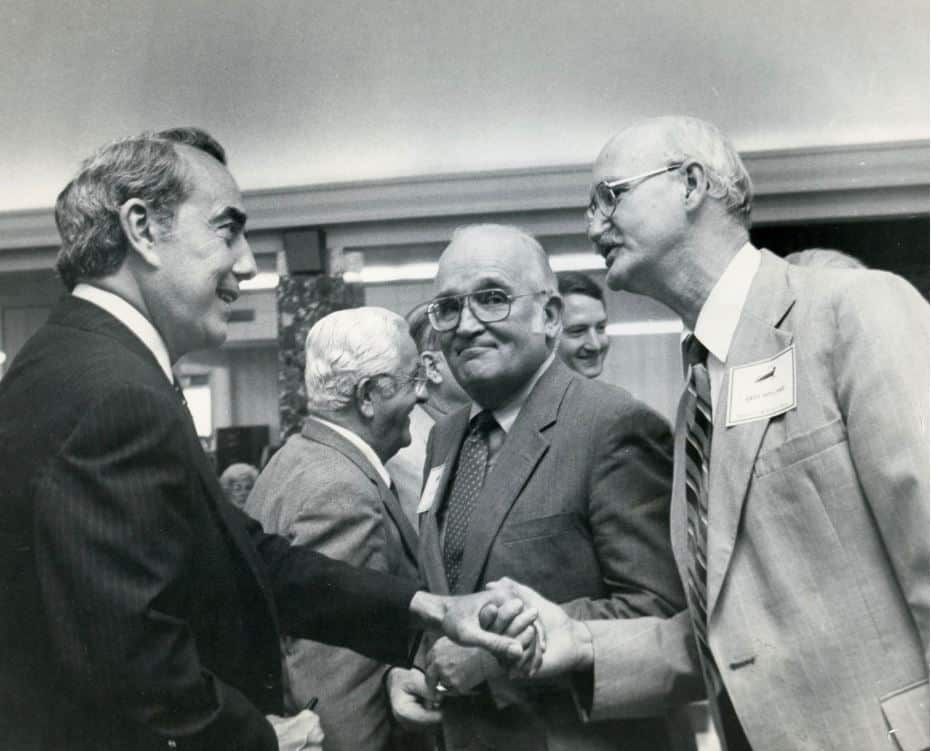
I was never supposed to spend a single moment typing away on the bizarrely Soviet-looking “One System” computers in The Mississippi Press newsroom. That just wasn’t my destiny when I graduated from Spring Hill College in 1989. I’d interned at the Mobile Press-Register and edited my college newspaper, and the Jesuits had assured me much bigger things lay ahead than my hometown daily.
My microscopic knowledge of the news industry and that SHC-infused hubris had me jumping into my 1978 VW Bug right after graduation, beelining for Florida and trying to decide whether I’d rather work at The Miami Herald or St. Pete Times. The Tampa Tribune and Orlando Sentinel were my backup choices. The Jacksonville Times-Union would absolutely have been slumming it. But it didn’t take long to realize these newspapers wouldn’t even let me in their parking lots, so swallowing my pride, I decided the Press-Register would be a fine place to start my professional journalism career after all.
The interview went perfectly and the editors who already knew me from my internship all but promised the job was mine. They just needed to conduct a few more interviews. Nothing more than standard hiring procedure. Awaiting “the call,” I cooled my heels at my parents’ house in Gautier, excited for the move back to Mobile. But my mother was unrelenting about not “putting all your eggs in one basket.” She badgered me to apply at The Mississippi Press “just in case.” So I did and was granted an interview.
That day I walked in and met editor Gary Holland for the first time. He was tall and gracious and didn’t quite look like what I expected a newspaper editor to look like. What I considered to be a superfluous interview was going along fine when the phone rang.
Gary answered and talked a bit then said, “Guess who I’m interviewing? Rob Holbert.” There was a pause and then Gary said, “No, we’re going to hire him.” The room spun. I knew instantly my plan was wrecked. There were several applicants in Mobile, but I was almost certainly the only journalist applying for the Ocean Springs Bureau job with The Mississippi Press. A day or two later, the P-R editor confirmed my fears, saying, “We were going to hire you, but since you applied over there we can fill all our positions. I’m sorry.”
The Ocean Springs Bureau was a tiny office in a strip mall in then-very sleepy Ocean Springs. Regina Hines was bureau chief. Debbie (Wood) Anglin and Iva Misko were also working there. It felt a little like the four of us were out on the frontier, deep in Sun-Herald territory and a bit of an afterthought.
When I wasn’t covering cops and city councils, I also started writing an opinion column, which I named The Rostrum after playing with the computer thesaurus for an hour. Why Gary let a 22-year-old blather on about national politics and whatever else I thought I understood I have no idea, but the column got surprisingly good feedback and I was allowed to continue.
Still, I was absolutely convinced I was in the wrong place and left for New Orleans to get a Master’s Degree after about 10 months in hopes of finding my way to a bigger newspaper in a bigger town. Even after I earned that diploma, though, nothing much came my way. I freelanced for something called The Daily Shipping Guide and was sports editor for the L’Observateur out in LaPlace, Louisiana. Debbie called me to let me know there was an opening. I passed. A few months later there was another call and I relented — back to The Mississippi Press, this time in the big office.
The MP was in a bit of transition at that time. About half the news staff were older reporters and editors who’d been there decades and were nearing retirement, while the other half were youngsters on our second or third jobs. Maybe it wasn’t The Miami Herald, but it was definitely better than what I’d been doing and they had at least finally banished the smokers to the front stoop.
Every morning’s first deadline was a flurry of activity. Of trying to pound out a story on the One System while Tom Donnelly told a story about insulting Moss Point’s mayor 20 years earlier. That computer system, which we joked would one day be replaced with “The Two System,” made every story an adventure. There was no good way to save a story in progress, so when it was all done you said a prayer and hit the button marked “Xmit.” Most of the time the story went into the mainframe. But sometimes it just went away. Gone. Poof! Hours of toil and finely crafted writing just disappeared.
Phones were thrown, profanity shouted, hair ripped out, walls punched. Gary would calmly say, “That’s too bad, but you’ve got 20 minutes to rewrite it,” or something equally encouraging. The whole place seemed to run on a mixture of sleep deprivation, caffeine, adrenaline and snack machine food. Every approaching deadline was announced by Gary clapping and saying, “OK boys and girls, I need an Old Crab! Who’s got an Old Crab for me?”
Writing an Old Crab was kind of a soft falling back to Earth from frantically writing a news story or two before deadline. No one was absolutely depending on MY Old Crab to be any good. There was competition in the room and even from people calling them in.
The Old Crab rules were pretty simple. It needed to be short and use some derivative of the word “dadburned.” Funny, accidental, purposeful or subjective, was a bonus. But I know every one of us felt some inner measure of pride when our OC was picked that day. The gold standard of Old Crabs, written by reporter Brian Cummings, was “Dadburn the dadburned dadburn.” It never made it into print, though. Perhaps it was too far ahead of its time.
I don’t know if I’ve ever felt more like a daredevil or gunslinger than those years at the MP. We worked hard and played harder. Scranton’s awaited most afternoons. There were mornings coming back from Biloxi two hours before work started. Certain parts of the newsroom smelled like a brewery. Others smelled like cigarettes with a hint of whiskey.
Gary let me resume my weekly column in addition to covering two police departments, the Pascagoula City Council and just about any animal story that came along. Eventually, he let me write the column two days a week, which was both brutal and exhilarating.
I’ve always thought almost any organization takes on the personality of the person at the top, and Gary’s was what made The Mississippi Press the fun, curious and sometimes whacky newspaper it was. Gary was a hardcore newsman, but he loved the unusual stories as much as the tough news, if not more, and he had a great sense of humor. He seemed to sense my interest in weird stories as well, so if something bizarre came over the transom he tended to send it my way. You truly didn’t know what might happen every day and what you might encounter.
There were so many formative journalism moments, like the time a squirrel managed to short out a transformer just outside the MP office, knocking out power to most of downtown. Gary had me put it in a shoebox and haul it up to the First Baptist Church so the preacher could hold the charred remains by the tail for some kind of Ray Stevens mashup photo snapped by Jerry Moulder. The day the squirrel went berserk indeed.
I interviewed Charles Hickson, one of the first men in America to claim he’d been abducted by aliens and got phone calls from all over the world from other reporters wanting to talk to him. Who knew he was such a big deal in the alien abduction world? A local politician stabbed holes in my tires one night after my reporting helped him lose an election, and Gary once had me hide in his office when an angry fisherman came to the office intent on causing me bodily harm. It wasn’t boring.
Gary also sent Bill Starling and me out in a Hurricane Hunter, which scared the Hell out of me but ultimately cured my fear of flying. He had me climb up the side of a Navy cruiser on a rope ladder in 6-foot seas, and another time I got to land on the deck of an LHD in a massive helicopter.
Journalism wasn’t all I learned from Gary. His way of managing also had a huge impact on me. He wasn’t afraid to let work be fun at times. At Christmas he would come into the office wearing a Santa hat and socks that played “Jingle Bells” to deliver bags of whatever condiments, crackers and drinks he could get with coupons he’d clipped all year. Every member of the newsroom got a sack of total randomness. I loved that he took his time to do that for his underpaid scribes.
Changes eventually came to The Mississippi Press. First Howard Bronson replaced Bill Hearin as publisher of both the MP and the Press-Register. Soon actual paper towels replaced the newsprint we’d used to dry our hands in the men’s room when Hearin was in charge, and that was an ominous sign of things to come. The Mississippi Press eventually got its very own publisher, and the changes really picked up. There were new computers — not The Two System after all — fancy desks and ergonomic chairs. We also got assigned parking, weren’t allowed to wear perfume or cologne to work and couldn’t use our $20 Christmas bonus coupon at Jerry Lee’s to buy beer anymore. (I may have been responsible for that one.)
I’d be lying if I said all of those changes were good or that they didn’t display the kinds of poor corporate decisions that finally ended The Mississippi Press and other Newhouse publications this week. Gary was ultimately a casualty of those changes, but he kept his chin up and went to work for The Biloxi Sun-Herald until his retirement.
I’ve been fortunate enough to run my own newspaper for nearly 21 years now and what I learned from Gary Holland and my colleagues at The Mississippi Press has played a huge role in building Lagniappe from nothing to one of the state’s largest weeklies and now Mobile’s only newspapers. There are many days when I think about how Gary would have handled something — particularly employees — because the man was the master of making you want to impress him.
These days, I’m the old guy sitting in my office listening to the young reporters talk too loud and tell off-color jokes as they pound out story after story. I love hearing it, because it takes me back to one of the most fun and exciting times of my life. But like Gary, now I’m the one to break it up and tell them to get back to work, even if I’m laughing on the inside.
The Mississippi Press was one dadburned great newspaper indeed and it changed my life — even though I was never supposed to work there.
Rob Holbert is a founder and co-publisher of Lagniappe — now Mobile’s only newspaper — and an award-winning columnist and investigative reporter. He worked at The Mississippi Press in 1989 -1990 and from 1992 – 1996.




